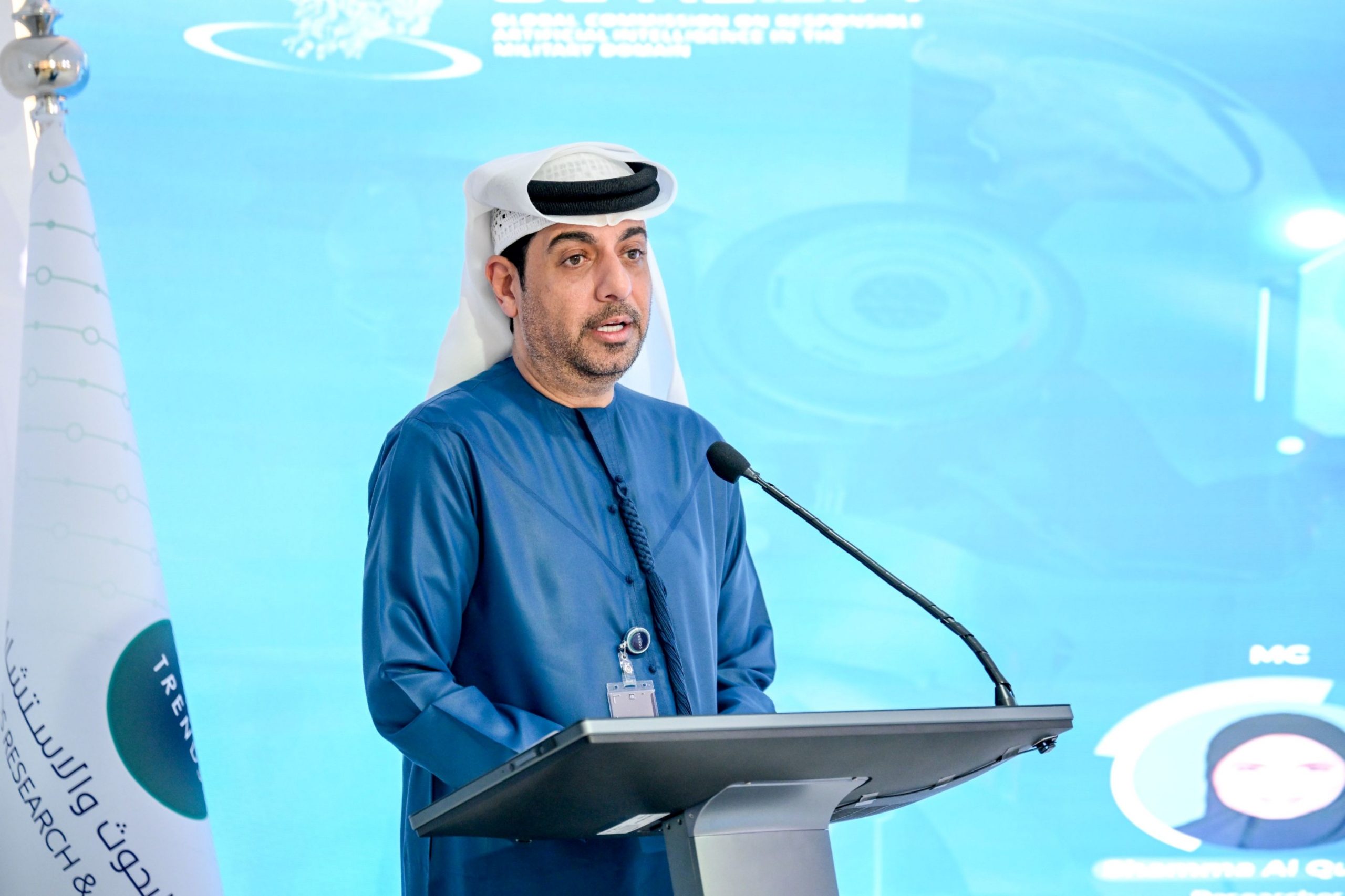A symposium titled Ethical Artificial Intelligence for Responsible Defense Governance, organized by the TRENDS Research & Advisory in close cooperation with the Global Commission on Responsible AI in the Military Domain (GC REAIM), has emphasized the growing importance of developing strong and robust ethical and regulatory frameworks to keep pace with the unprecedented and rapid advancements in artificial intelligence, especially in sensitive and strategic sectors such as defense.

TRENDS hosted this important event over three days at its headquarters in Abu Dhabi, with support from its international offices worldwide. The event was part of the fourth meeting of the Global Commission on Responsible AI in the Military Domain, the outcomes of which will be submitted to the United Nations as a global strategic plan.
A distinguished group of high-level experts and specialists from various vital sectors, including government, defense, academia, and leading technology companies, attended the symposium.
They exchanged visions and ideas and explored the growing role of developing AI responsibly and ethically. Particular focus was placed on fine ethical considerations, effective governance frameworks, and practical applications in vital and strategic sectors that serve regional and international peace and security.

Opening Address
The symposium opened with the keynote addresses of prominent AI and governance leaders. In his opening remarks, Dr. Mohammed Al-Ali, CEO of TRENDS Research & Advisory, emphasized the importance of the partnership between TRENDS and the Global Commission on Responsible AI in the Military Domain (GC REAIM) in raising awareness and understanding of the governance of military AI.
He noted that this cooperation aims to support the development of fundamental standards to regulate and guide rapid advancements in this field in service of global peace and security. He also highlighted TRENDS’ participation in other relevant events and affirmed its commitment to supporting AI governance efforts.
Dr. Tim Sweijs, Director of Research at The Hague Centre for Strategic Studies and Secretary of GC REAIM, delivered welcoming remarks, which were followed by a keynote speech by H.E. James Anthony Morse, President of Rabdan Academy, all emphasizing the importance of the topic and the necessity of international cooperation.

Gulf Perspectives
The first session, moderated by Steven Skalet, Scientific Advisor at Trends Global, featured contributions from Dr. Saeed Al Dhaheri, Director of the Center for Futures Studies at the University of Dubai and member of GC REAIM; Dr. Ibtisam Al Mazrouei, CEO and Founder of AIE3; Mr. Ahmed Al Khouri, SVP of Strategy and Excellence at EDGE Group; Ms. Shamsa Al Qubaisi, Researcher at Trends Research & Advisory; and Mr. Abdullah Al Kaabi, Senior Executive Director of Technology Consulting at PwC Middle East. The speakers shared Gulf perspectives and efforts in the responsible development and use of AI in the military domain.

Lessons Learned
The second session, moderated by Dr. Tim Sweijs, featured Ms. Nour Al Mazrouei, Senior Researcher and Head of the AI Program at Trends; Dr. Petros Violakis, Assistant Professor at Rabdan Academy; Dr. Denise Garcia, Professor at Northeastern University and GC REAIM member; Dr. Yasmin Afina, Researcher in the Security and Technology Program at UNIDIR and Commission expert; and Dr. Li Qiang, Associate Professor of Law and Director of the Institute of Military Law at the China University of Political Science and Law and Commission expert. The session focused on lessons learned from past arms governance initiatives and their application to military AI.

Global Landscape
The third session, moderated by Sophia Romanski, Strategic Analyst at The Hague Centre for Strategic Studies and Project Coordinator at GC REAIM, included Dr. Michael Horowitz, Director of Perry World House and Professor at the University of Pennsylvania and Commission member; Dr. Ingvild Bode, Associate Professor at the Center for War Studies, University of Southern Denmark and Commission expert; Dr. Giacomo Persi Paoli, Head of Security and Technology Programme at UNIDIR and Commission expert; and Mr. Nasser Al Rashdi, CEO of 5iR Technology Consultancy. The participants examined the current global discourse surrounding the governance of military AI.

Practical Mechanisms
The final session, moderated by TRENDS researcher Issa Al-Mannai, featured Dr. Saeed Al Dhaheri, Brigadier General Jose Maria Mian Martinez from the Spanish Ministry of Defense, Dr. Nils Arne Norlander, retired Lieutenant Colonel and Assistant Professor of Defense and Security at Rabdan Academy, and Ms. Jessica Dorsey, Assistant Professor of International and European Law at Utrecht University and Commission expert. This session discussed practical mechanisms for applying AI governance principles throughout the AI lifecycle in military applications.

Robust and Effective Governance
The symposium particularly emphasized the urgent need to develop strong and effective governance frameworks to guide the deployment and use of AI in the defense sector. Key potential risks were thoroughly discussed, such as the development of fully autonomous AI in defense and healthcare applications, the impact of AI on the labor market and possible job losses, and the issue of complex algorithmic accountability.
There was repeated emphasis on the need for globally agreed-upon standards, ensuring effective human oversight of AI systems, and building the necessary capabilities among policymakers and regulators to keep up with rapid developments in the field.
The symposium concluded with key future action items, including the necessity of close collaboration with the AI71 Initiative to develop AI skills among all defense stakeholders and the encouragement of co-development of innovative AI solutions with end-users to ensure practical and ethical applications.
Participants discussed intensive investment in ethical AI research and frameworks focusing on transparency, fairness, and international alignment. They also addressed complex challenges related to AI system interpretability, autonomous decision-making, and enhancing practical global regulatory cooperation.



